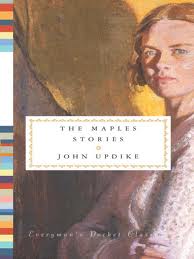
The Maples Stories are 18 short stories that are autobiographical as they tell of a 20 year marriage that ends in divorce much as John Updike’s first marriage did. They begin with “Snowing in Greenwich Village” written in 1956 and end with “Grandparenting” written in 1994.
Central Library’s Brown Baggers Book Group discussed this collection of stories at its January meeting. Many of the group mentioned that, although they read all the stories, they did not like the characters at all. We began by talking about Updike’s writing style in general and how it developed through the stories from that of a very young writer (Updike was in his early 20’s when he wrote the first stories) until the final one.
Next we took up a major theme of much of Updike’s writing – marriage. The group disliked the Updike portrayal of marriage in which we saw as one that wealthy intellectuals could indulge in with its disloyalties, affairs, and stereotypical views of men and women. We debated whether this was indeed a view of real middle class suburban marriages. Ultimately Updike himself says that he feels that just because a marriage ends, it does not mean that it was a failure.
Updike’s portrayal of men and women was especially interesting. The main male character of these stories, Richard Maple, seemed to have very little to do outside the home. Because Updike began writing at such an early age, he himself never spent time in an office so knew little of “men’s” work of the time. This is quite apparent when you see how he develops Richard Maple’s character.
As for women in Updike’s writings, Michiko Kakutani in her article “Updike’s Struggle to Portray Women,” The New York Times (5 May 1988) wrote that “readers have occasionally objected to his portrayals of women, criticizing them as being merely ”wives, sex objects and purely domestic creatures.” Kakutani also mentions that readers felt that even when Updike thought he was writing more complete female portrayals his writings were still “attacks on women (particularly ”liberated” women) than earnest portrayals.” To Kakutani “the earlier novels and stories never seemed willfully or narrowly sexist,” but “these descriptions were meant to reflect a male character’s;” for example: describing Joan Maple’s hand, “distinctly thirtyish, dry and green-veined and rasped by detergents.” Our group did think that Joan Maple matured well as she moved through the stories, and this again showed Updike’s maturation process through this collection of stories.
The most interesting feature of these stories and other Updike writings is his story-telling ability. He is a master of describing the everyday life and has been compared to Chekhov and Joyce in this aspect. We were fascinated with the many vignettes that he presented in the stories; from the story “Wife-Wooing” for example: “The girl and I share one half-pint of potatoes; you and the boy share another; and in the center, sharing nothing, making simple reflections within himself like a jewel, the baby, mounted in an Easybaby, sucks at his bottle with frowning mastery, his selfish, contemplative eyes stealing glitter from the center of the flames.”
We were especially touched by the last story “Grandparenting” in which the birth of their first grandchild brings the Maples together in the maternity ward. Even though they are divorced and each remarried, one can see they are still attached and can relate on an intimate level. A funny poignant moment is captured by the following quote at the end of that story as Joan and Richard were going their separate ways: “Richard thought of kissing her goodnight,” the author tells us, “but their faces were probably still icy, and his neck didn’t turn as easily as it used to.”
Most of the group found that, after the discussion, they did find more merit in the stories even though they still did not find the characters very appealing.
Also consider what Updike means when he ends the final story with this comment: “Nobody belongs to us, except in memory.”
Have your other readings of Updike brought up the themes mentioned here?
What features would you highlight in Updike’s writing?
– ZM
Adult and Reference Services
Perhaps I should say Angstrom’s awareness of the signs, or, to be a bit more accurate, Updike’s descriptions of Angstrom’s awareness of the signs, rather than the signs themselves.
http://postmoderndeconstructionmadhouse.blogspot.com/2013/12/signs-and-signage-in-updikes-rabbit.html#.UyN2cj9dXxA